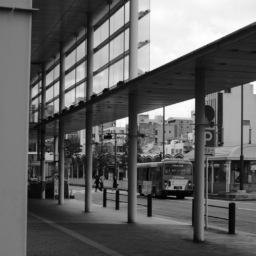ADAPTIVE REUSE
Embarking on the journey of transforming a previously abandoned space into a thriving hub for art and film, the Idaho Film Society (IFS) faced a formidable challenge. This innovative non-profit, comprised of film producers, actors, and enthusiasts based in Boise, Idaho, envisioned repurposing the deserted Greyhound bus terminal to create a vibrant space for the local community.
A young architecture graduate from the University of Idaho’s urban planning program, approached us to join the IFS team. In the early stages, the board of directors was taking shape, and the organization had ambitious plans to offer theater experiences within the confines of the abandoned building in downtown Boise.
Having been abandoned in 2019, the Greyhound bus terminal, designed by the renowned architect Charles Hummel, presented a unique opportunity. Acquired by an investor with development intentions, the building was generously offered to IFS for a remarkable lease of $1 per year. Despite the stark contrast in functionality between the non-profit tenant and the original owner, our firm joined the project team pro bono, providing design and code guidance.
The journey wasn’t without its challenges. The lack of a formal lease agreement led to some missteps, with the organization occupying the space without proper documentation. Working closely with the graduate, we addressed issues related to code compliance, health, safety, and welfare upgrades. Through careful examination, we discovered the building’s unique features, including its mid-century design, steel-framed structure, and historical significance.
Our collaboration with general contractors, mechanical, and electrical experts ensured that necessary upgrades were identified and planned. The process involved developing comprehensive plans to represent proposed changes to the space, taking into account the requirements for occupancy, safety, and accessibility.
One notable aspect was the recognition of the Greyhound bus terminal’s historical significance. Working with the graduate, we explored the possibility of obtaining a historic designation, preserving the building’s character and potentially reducing costs. Historic documentation was uncovered, supporting the case for registration with the National Trust for Historic Places which had its merits and benefits.
Despite the challenges and initial naivety of the organization, IFS persevered. The absence of a formal lease agreement and undefined parking rights were obstacles that required careful navigation. The organization’s leadership demonstrated admirable determination, even as they faced the realization that code requirements could not be waived.
As consultants, our role was exploratory, guiding the tenant through the complexities of as-built documentation and construction drawings. The collaborative effort aimed to fulfill both the tenant’s vision and the building department’s requirements. The process revealed expected code requirements, and the focus remained on ensuring the health, safety, and welfare of the public, especially in high-occupancy spaces like their theater.
Despite the challenges, IFS successfully hosted its initial fundraiser in an established downtown theater with a much larger seating capacity. This event marked a significant step forward for the organization, providing essential funding for building upgrades, operational costs, and staff salaries.
In conclusion, the adaptive reuse of the Greyhound bus terminal by the Idaho Film Society stands as a testament to the transformative power of determination and vision. The journey involved overcoming obstacles, navigating code requirements, and recognizing the historical significance of the space. With the community’s support, IFS continues its mission to build a thriving arts and film community.


